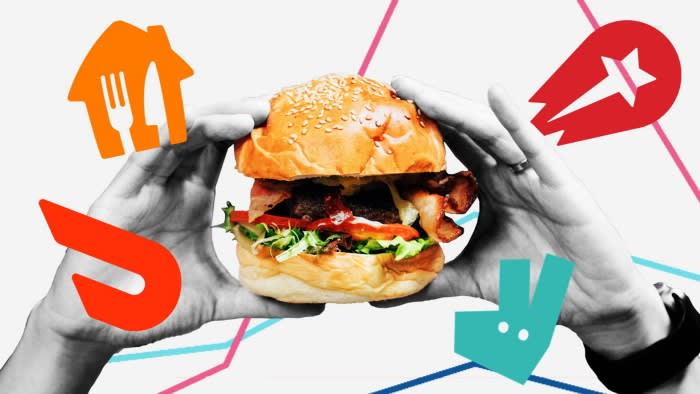The leading online food delivery groups in Europe and the US have racked up more than $20 billion in combined operating losses since going public after a fierce battle for market share.
Shares in Deliveroo, Just Eat Takeaway, Delivery Hero and DoorDash — the four largest stand-alone, publicly listed food delivery companies in the U.S. and Europe — are all trading well below their pandemic-era highs as investors scrutinize their business models .
After a period of pandemic-fueled growth, the four companies are now grappling with a tougher macroeconomic environment that has hit consumers hard.
As they make a renewed push to demonstrate profitability to investors, their cumulative annual operating losses have now reached $20.3 billion, calculations by the Financial Times and industry analyst theDelivery.World found.
The figure covers the seven years since Deliveroo, Delivery Hero and DoorDash went public and since the creation of Just Eat Takeaway after a merger in 2020. It includes significant write-downs related to acquisitions and stock-based compensation.
“Investors’ willingness to finance losses has changed” and they now want food delivery businesses to “demonstrate sustainable, profitable growth” after interest rate rises, said UBS analyst Jo Barnett-Lamb.
Rival Uber does not disclose the profitability of its Eats business, but it marked its first full year of group-wide operating profitability in 2023 after a concerted effort to boost margins, a moment the company hailed as a “turning point”.

For years, venture capital groups poured money into so-called “gig economy” companies that subsidized food deliveries to attract low-priced customers and gain market share.
However, investors have shifted their focus to yield as interest rates have risen, although operating costs incurred by companies, including marketing, remain high.
The sector must also contend with continued scrutiny by regulators and labor groups over workers’ rights. If couriers are paid higher wages, skeptics argue that consumers will never be willing to pay the true cost of food delivery.
However, stock market analysts are becoming increasingly optimistic that companies can improve their financial performance. In April, the three European players said they expected DoorDash to follow this year by becoming free cash flow positive on a year-over-year basis.

The focus on free cash flow follows a long-standing emphasis among companies in the sector on an alternative measure of earnings – adjusted earnings before interest, taxes, depreciation and amortization – that strips out a range of costs such as legal regulations.
But many people “don’t see [adjusted earnings metrics] as a true level of profitability of the underlying business,” said Joseph McNamara, an analyst at Citi.
Operating losses offer “the best standardized view for all companies” that minimizes adjustments and other non-cash and non-operating impacts, said Amanda Beninkasa Arena, a partner at management consulting firm Aon.
Whether companies can show they’re generating more cash than they’re spending is the next big “litmus,” McNamara added, now that the “growth at any cost” stage is over.
Giles Thorne, an analyst at Jefferies, noted that consumers have continued to use the services in recent years “despite having less money and despite being charged more” – because of fewer discounts and higher inflation – which he said supports the long-term prospects of the sector.
Although the online food delivery sector was boosted by the impact of the pandemic, sales growth rates have fallen in the years since. The groups are looking to develop new revenue streams to help accelerate growth, such as grocery delivery and higher-margin advertising businesses.

Uber has credited the expansion of the range of services it offers for helping to increase overall sales, increase the number of users and improve economies of scale.
The emerging industry is also witnessing a period of consolidation, with some players exiting certain markets and others looking to double down in places they believe they can dominate.
US-focused DoorDash previously told the FT it wanted to enter new markets, while Delivery Hero announced in May it planned to sell its Taiwan business to Uber to “focus our resources” elsewhere. In January, the German group also sold its minority stake in London-listed Deliveroo.
Historic deals also hit some of the four companies’ bottom lines, but a sharp decline in industry valuations led to write-downs.
The extent of JET’s losses in 2022 and 2023 were due in part to a total of $6.5 billion in writedowns on the businesses it acquired, with impairments mostly related to Grubhub, which JET is struggling to offload from 2022, and Just Eat. Delivery Hero also reported significant recent write-downs totaling about $1.7 billion in 2022 and 2023.
Impairments could indicate that an acquisition or merger is not “moving along” as hoped, Aon’s Benincasa Arena said. Back-to-back write-offs can mean that a company is “entering the wrong markets through an acquisition or that it’s not doing operations right when it’s in those markets,” she said.
Expenses related to employee stock awards also hit operating profits, with DoorDash reporting more than $1 billion in such expenses in 2023.
Operating losses after the listing:
JET: operating losses of $9.1 billion since it was created by the merger of UK-based Just Eat and Netherlands-based Takeaway.com in 2020.
Delivery hero: operating losses of $7.8 billion since 2017, when it went public.
DoorDash: operating losses of $2.6 billion from 2020 when it went public.
Deliveroo: operating losses of $777 million by 2021, when it goes public.
Deliveroo said: “We continue to make strong progress against our strategic priorities and remain confident in our ability to deliver profitable growth.”
DoorDash said it has “invested billions” to help merchants “build successful businesses,” adding that the company is expected to provide “[generally accepted accounting principles] profitability over time”.
Emmanuel Thomasin, Delivery Hero’s chief financial officer, said the operating losses included “items that are not considered operationally significant to measure the company’s economic development.” The company is more focused on other metrics, including free cash flow, he added.
JET declined to comment.
